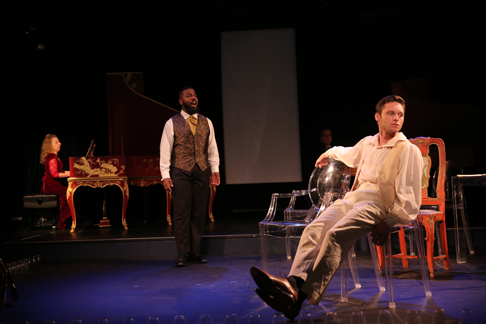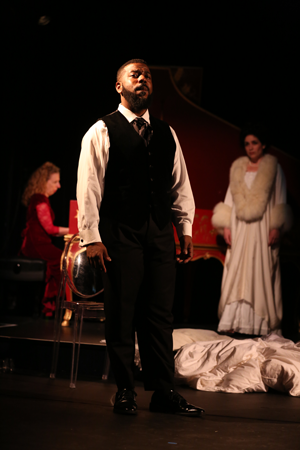Recently in Performances
English Touring Opera are delighted to announce a season of lyric monodramas to tour nationally from October to December. The season features music for solo singer and piano by Argento, Britten, Tippett and Shostakovich with a bold and inventive approach to making opera during social distancing.
This tenth of ten Live from London concerts was in fact a recorded live performance from California. It was no less enjoyable for that, and it was also uplifting to learn that this wasn’t in fact the ‘last’ LfL event that we will be able to enjoy, courtesy of VOCES8 and their fellow vocal ensembles (more below …).
Ever since Wigmore Hall announced their superb series of autumn concerts, all streamed live and available free of charge, I’d been looking forward to this song recital by Ian Bostridge and Imogen Cooper.
Although Stile Antico’s programme article for their Live from London recital introduced their selection from the many treasures of the English Renaissance in the context of the theological debates and upheavals of the Tudor and Elizabethan years, their performance was more evocative of private chamber music than of public liturgy.
Evidently, face masks don’t stifle appreciative “Bravo!”s. And, reducing audience numbers doesn’t lower the volume of such acclamations. For, the audience at Wigmore Hall gave soprano Elizabeth Llewellyn and pianist Simon Lepper a greatly deserved warm reception and hearty response following this lunchtime recital of late-Romantic song.
For this week’s Live from London vocal recital we moved from the home of VOCES8, St Anne and St Agnes in the City of London, to Kings Place, where The Sixteen - who have been associate artists at the venue for some time - presented a programme of music and words bound together by the theme of ‘reflection’.
'Such is your divine Disposation that both you excellently understand, and royally entertaine the Exercise of Musicke.’
‘And there was war in heaven: Michael and his angels fought against the dragon; and the dragon fought and his angels, And prevailed not; neither was their place found any more in heaven … that old serpent … Satan, which deceiveth the whole world: he was cast out into the earth, and his angels were cast out with him.’
There was never any doubt that the fifth of the twelve Met Stars Live in Concert broadcasts was going to be a palpably intense and vivid event, as well as a musically stunning and theatrically enervating experience.
‘Love’ was the theme for this Live from London performance by Apollo5. Given the complexity and diversity of that human emotion, and Apollo5’s reputation for versatility and diverse repertoire, ranging from Renaissance choral music to jazz, from contemporary classical works to popular song, it was no surprise that their programme spanned 500 years and several musical styles.
The Academy of St Martin in the Fields have titled their autumn series of eight concerts - which are taking place at 5pm and 7.30pm on two Saturdays each month at their home venue in Trafalgar Square, and being filmed for streaming the following Thursday - ‘re:connect’.
The London Symphony Orchestra opened their Autumn 2020 season with a homage to Oliver Knussen, who died at the age of 66 in July 2018. The programme traced a national musical lineage through the twentieth century, from Britten to Knussen, on to Mark-Anthony Turnage, and entwining the LSO and Rattle too.
With the Live from London digital vocal festival entering the second half of the series, the festival’s host, VOCES8, returned to their home at St Annes and St Agnes in the City of London to present a sequence of ‘Choral Dances’ - vocal music inspired by dance, embracing diverse genres from the Renaissance madrigal to swing jazz.
Just a few unison string wriggles from the opening of Mozart’s overture to Le nozze di Figaro are enough to make any opera-lover perch on the edge of their seat, in excited anticipation of the drama in music to come, so there could be no other curtain-raiser for this Gala Concert at the Royal Opera House, the latest instalment from ‘their House’ to ‘our houses’.
"Before the ending of the day, creator of all things, we pray that, with your accustomed mercy, you may watch over us."
The doors at The Metropolitan Opera will not open to live audiences until 2021 at the earliest, and the likelihood of normal operatic life resuming in cities around the world looks but a distant dream at present. But, while we may not be invited from our homes into the opera house for some time yet, with its free daily screenings of past productions and its pay-per-view Met Stars Live in Concert series, the Met continues to bring opera into our homes.
Music-making at this year’s Grange Festival Opera may have fallen silent in June and July, but the country house and extensive grounds of The Grange provided an ideal setting for a weekend of twelve specially conceived ‘promenade’ performances encompassing music and dance.
There’s a “slide of harmony” and “all the bones leave your body at that moment and you collapse to the floor, it’s so extraordinary.”
“Music for a while, shall all your cares beguile.”
The hum of bees rising from myriad scented blooms; gentle strains of birdsong; the cheerful chatter of picnickers beside a still lake; decorous thwacks of leather on willow; song and music floating through the warm evening air.
Performances
![Rinat Shaham [Photo by Joan Marcus]](http://www.operatoday.com/RinatShaham_byJoanMarcus.png)
14 Jun 2015
German Lieder Is Given a Dramatic Twist by The Ensemble for the Romantic Century
The Ensemble for the Romantic Century offered a thoughtful and well-curated evening in their production of The Sorrows of Young Werther, which is part theatrical performance and part art song concert.
Writer James Melo
adapted Johann Wolfgang von Goethe's novella into a series of monologues
(engagingly performed with the perfect balance of youth and gravitas by
actor Bobby Seggert) interspersed with songs from Schumann's
Dichterliebe, sung by Sidney Outlaw, and then a mix of songs from
the German Lieder repertoire, sung by mezzo-soprano Rinat Shaham.
The evening was visually stunning, with a soft pink lighting that suggests
the pastoral love that will eventually turn to tragedy. Additionally, the
lighting team expertly executed each lighting cue. Three projections on each
side of the audience offer translations of the texts on the backdrop of
various bucolic images. While subtitles are not always an aspect to be
remarked upon, these were so astutely designed and well-executed that it
would be remiss not to mention them. The production team of The Sorrows
of Young Werther managed to cultivate the idyllic backdrop of Goethe's
tale using atmospheric lighting, projections, and minimal set pieces. The
only main distractor was a large screen on the back of the stage on which
gritty, modern scenes of various men and women were projected, which seemed
to make very little sense in the overall ambience of the evening. At best,
these projections were confusing; at worst, they were completely distracting
from what were otherwise moments of real beauty in the show.
 Sidney Outlaw and Bobby Seggert
Sidney Outlaw and Bobby Seggert
The two-hour evening flowed comfortably between Werther's monologues and the
chosen Lieder. Bobby Seggert fluctuated between casual emoting and full
realization of his tragic situation, with a boyish charm that highlighted
the naiveté that ultimately leads to Werther's downfall. James Melo's
adaptation for the stage never felt tiresome, but instead engaged the
audience between moments of tranquil calm and bitter angst. Indeed, the text
adaptation held some of the strongest moments of the evening.
Baritone Sidney Outlaw is one of those consummate professionals who is an
absolute pleasure to behold onstage. His rendition of Schumann's
Dichterliebe, carefully disseminated throughout Melo's adaptation of
Goethe's novella, was crisp, thoughtful, and intelligent. He employed a
gentle, intimate style of singing, until the final song when he unleashed a
rich baritone voice of impressive size and power.
Mezzo-soprano Rinat Shaham had a rich, shimmering voice that filled the
theater well. However, in contrast with Outlaw's easy confidence, Shaham
spent the entire concert attached to a musical score on a stand or in her
hands. In the context of a chamber music concert, it normally would not be
remarkable, but some seeming insecurity with the music created moments of
tension in Shaham's voice. She blossomed on songs with which she seemed to
have more confidence, in particular on two Liszt songs.
 Sidney Outlaw with Rinat Shaham in background
Sidney Outlaw with Rinat Shaham in background
Pianists Eve Wolf and Max Barros gave beautiful performances on piano.
Barros in particular made the piano drip with beauty and elegance, with an
incomparable grace in his legato.
An evening such as this is something that needs to be done more often. The
Ensemble for the Romantic Century manages to make a chamber music concert
into so much more, adding drama, narrative, and production value that goes
beyond the beauty of an art song concert. Using the inherent drama in German
Lieder to create an evening of storytelling is a brilliant way in which to
transform the landscape of average concert-going. The Ensemble for the
Romantic Century not only does this creatively, but with nimble execution.
Alexis Rodda
![Rinat Shaham [Photo by Joan Marcus]](http://www.operatoday.com/RinatShaham_byJoanMarcus.png)

